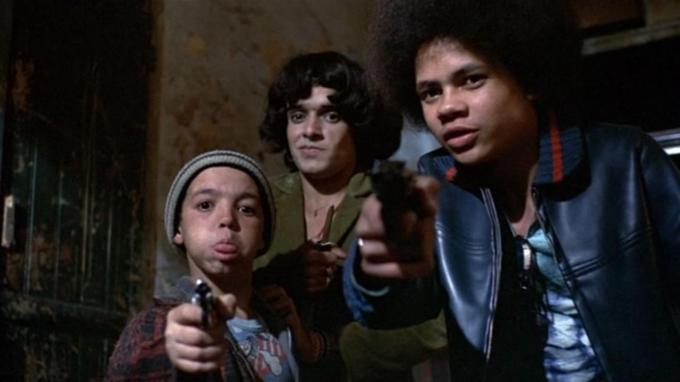 Before City of God there was Pixote, Héctor Babenco’s stark lucid account of Brazilian youths growing up in squalor in the 70s. It chronicles the life of 10-year-old Pixote and his companions, from repression and jail time to pickpocketing in Rio to close encounters with prostitution and death. Babenco makes the audience feel the urgency of the present time the way the characters experience it: with the past being too shameful to speak of and the future non-existent, the present, for all its terror, is all that’s left. As the world crumbles all around them and the kids lose respect not just for the lives of others but for their own, the movie’s vitality risks becoming jarring if not outright cruel. But it quickly becomes apparent that the full immersion in the amoral present they share is the closest thing they’ll ever know to redemption: it’s where their camaraderie, their symbiotic relationship with each other, even their shifting sexual confusion are built. And though the movie is clearly an heir to the great neo-realist films of the 40s and 50s, it goes deeper than them. It touches on forbidden, wordless things. When Pixote meets the volatile prostitute Sueli (Marília Pêra, superb) and discovers she’s had an abortion, he is horrified. She feels judged and lashes out at him in a rage, but he’s horrified not for her but for himself—his entire orphaned existence coming into focus. The relationship that builds between the whore-mother and her adopted children is monstrously, inexplicably rich. The very protagonists can’t figure out the nature of it, so they just go through it blindly, until their roles become so confused that they devour each other. For Pixote, it’s a return to the womb from hell. In the movie’s best scene, he goes to the prostitute’s den looking for a mother’s embrace. She tentatively takes on this role. But Pixote is no child and never was. Retreat to innocence is impossible, and he is vomited out one final time. Alone, he isn’t just worthless: he’s not even alive. The film goes beyond surface moral and social indignation. This is an artist’s statement. Yet no matter how hard the implications this movie has a pulse like few others, with the natural energy of the places and the actors giving it its incomparable freshness.
Before City of God there was Pixote, Héctor Babenco’s stark lucid account of Brazilian youths growing up in squalor in the 70s. It chronicles the life of 10-year-old Pixote and his companions, from repression and jail time to pickpocketing in Rio to close encounters with prostitution and death. Babenco makes the audience feel the urgency of the present time the way the characters experience it: with the past being too shameful to speak of and the future non-existent, the present, for all its terror, is all that’s left. As the world crumbles all around them and the kids lose respect not just for the lives of others but for their own, the movie’s vitality risks becoming jarring if not outright cruel. But it quickly becomes apparent that the full immersion in the amoral present they share is the closest thing they’ll ever know to redemption: it’s where their camaraderie, their symbiotic relationship with each other, even their shifting sexual confusion are built. And though the movie is clearly an heir to the great neo-realist films of the 40s and 50s, it goes deeper than them. It touches on forbidden, wordless things. When Pixote meets the volatile prostitute Sueli (Marília Pêra, superb) and discovers she’s had an abortion, he is horrified. She feels judged and lashes out at him in a rage, but he’s horrified not for her but for himself—his entire orphaned existence coming into focus. The relationship that builds between the whore-mother and her adopted children is monstrously, inexplicably rich. The very protagonists can’t figure out the nature of it, so they just go through it blindly, until their roles become so confused that they devour each other. For Pixote, it’s a return to the womb from hell. In the movie’s best scene, he goes to the prostitute’s den looking for a mother’s embrace. She tentatively takes on this role. But Pixote is no child and never was. Retreat to innocence is impossible, and he is vomited out one final time. Alone, he isn’t just worthless: he’s not even alive. The film goes beyond surface moral and social indignation. This is an artist’s statement. Yet no matter how hard the implications this movie has a pulse like few others, with the natural energy of the places and the actors giving it its incomparable freshness.
Dir. Héctor Babenco / 1981 / Brazil